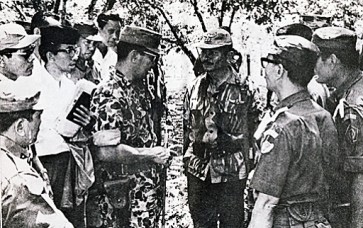Popular Reads
Top Results
Can't find what you're looking for?
View all search resultsPopular Reads
Top Results
Can't find what you're looking for?
View all search resultsMass killings in Indonesia and Cambodia
The mass killings in Indonesia in 1960s did not fully “fit” with the definition of genocide as stated in the 1948 Convention on the Prevention and Punishment of the Crime of Genocide.
Change text size
Gift Premium Articles
to Anyone
 A dark history: Maj. Gen. Soeharto briefs members of the Army’s Special Forces (RPKAD, now Kopassus) prior to the removal of the bodies of the Army generals who were murdered during an alleged coup attempt on Sept. 30, 1965, which was blamed on the now defunct Indonesian Communist Party (PKI). (JP/30 Tahun Indonesia Merdeka/-)
A dark history: Maj. Gen. Soeharto briefs members of the Army’s Special Forces (RPKAD, now Kopassus) prior to the removal of the bodies of the Army generals who were murdered during an alleged coup attempt on Sept. 30, 1965, which was blamed on the now defunct Indonesian Communist Party (PKI). (JP/30 Tahun Indonesia Merdeka/-)
C
ommunists – or their sympathizers – launched an alleged coup in Indonesia 57 years ago. Until today, the country still commemorates the six military generals killed by the perpetrators of the coup on the evening of Sept. 30, 1965.
As the attempted coup failed, a counter-coup followed starting on Oct. 1 of that year and as a result, massacres took place. Various sources stated that at least around 500,000 suspected communists and up to 1.2 million people were killed during that period.
Until 1965, the Indonesian Communist Party (PKI) was the third largest communist party after China and the then-Soviet Union. But unlike the People's Republic of China and the Soviet Union, the PKI was not fully in power. At its peak, the PKI had about 20 million members.
Less than 10 years later, on April 17, 1975, the Communist Khmer Rouge entered Phnom Penh, Cambodia's capital, and almost immediately started the evacuation of the city and the killings of all “undesirables,” putting them in large concentration or labor camps.
From April 1975, the fall of Phnom Penh, to the invasion of Vietnamese forces on Jan. 7, 1979, the United Nations reported that up to 1.6 million people (out of a total population of about 7 million) might have died in 1979 due to the Khmer Rouge policies and practices.
In Indonesia it was the so-called anti-communists who did the killings and ten years later it was the Khmer Rouge who conducted massacres, partly subscribing themselves to communist or Maoist ideas.
Though some sources described the killings in Indonesia as a “genocide” and a few somewhat anomalously described it as “politicization” – since the target groups were political groups, communists or alleged communists – it did not fully fit with the definition of genocide as stated in the 1948 Convention on the Prevention and Punishment of the Crime of Genocide. In any case, Indonesia was not a party to the Genocide Convention in 1965 nor is it now in 2022.

















